Nixon-Mao at 50
The historic 1972 meeting between the US and Chinese leaders arguably indicated that there could be no permanent peace in the world unless the two countries were able to work together. At the same time, open societies must never forget that democratic values remain a better long-term bet than totalitarianism.
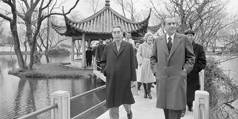
Nixon Was Right to Gamble on China
Revisionist critics argue that the US president’s 1972 visit to China, far from being a diplomatic masterstroke, was a huge strategic blunder. But a policy of engagement that helped produce 40 years of peace, prosperity, and stability between two former staunch foes must be considered a resounding success.
CLAREMONT, CALIFORNIA – With China currently the only country capable of unseating America as the leading global power, many in Washington may wish that US President Richard Nixon had never made his historic trip to China 50 years ago this month. In their revisionist narrative, it was Nixon’s meeting with Communist Party of China Chairman Mao Zedong, and the policy of engagement it initiated, that helped make China an economic superpower and a geopolitical threat to America. For these critics, the Nixon visit, far from being a stroke of diplomatic genius, was one of history’s greatest strategic blunders.
But such revisionist arguments discount the substantial benefits the United States gained from Nixon’s gambit and the decades of US-China engagement that followed. Although China did not directly assist the US, Nixon’s visit shifted the perceived Cold War balance of power and influenced the strategic calculations of both the Soviet Union and North Vietnam, resulting in immediate US gains. America and the Soviet Union signed the first nuclear arms control treaty (SALT I) in May 1972, and the US extricated itself from Vietnam a year later.
Engagement with China also yielded significant longer-term geopolitical and economic dividends for the US. Regional tensions in East Asia eased dramatically, mitigating the Chinese threat to vital US interests there, while the US-China quasi-alliance against the Soviet Union in the 1980s contributed to America’s victory in the Cold War.
On the economic front, lower-priced imports from China helped to contain US inflation, while US exports to China grew rapidly and American corporations extended their reach into the country’s domestic market. Although competition from Chinese imports led to the loss of US manufacturing jobs, it is difficult to argue credibly that the US has not reaped economic benefits from its engagement policy.
To be sure, China has gained substantially more than the US in economic terms from the bilateral relationship. But that was mainly due to the process of reform and opening launched by Deng Xiaoping in 1979. Nobody, least of all Nixon or Mao, could have foreseen the Chinese economic miracle that was to materialize in the decades after their fateful encounter. At the time of Nixon’s visit, Deng was in the political wilderness, performing menial labor in Jiangxi province. It was Mao’s death in 1976 and Deng’s subsequent political rehabilitation and elevation that altered the course of Chinese history.
If the Nixon-Mao meeting made any difference in terms of China’s rise, it was by saving Deng the trouble of having to start from scratch in normalizing relations with the US. Without the Sino-American rapprochement that Nixon and Mao engineered (mainly to counter the shared Soviet threat), Deng would have needed more time and effort to persuade the West to embrace China, which had been a pariah state before 1972.
Revisionists also seem to forget that the US-China relationship forged by Nixon rested on fragile foundations, and that America’s engagement policy was in constant danger of being derailed by actions or events in both countries. Deng himself nearly brought US-China engagement to an end when he crushed the peaceful pro-democracy demonstrations in Tiananmen Square in June 1989. Only the intervention of President George H.W. Bush, who had served as the second US envoy to China from 1974 to 1975, saved the policy, at the cost being criticized for kowtowing to the “butchers of Beijing.”
Nixon’s legacy was imperiled again in 2001, when the neo-conservatives who held sway in President George W. Bush’s administration decided that a fast-growing China posed a geopolitical threat and must be confronted. But 9/11 intervened before they could implement a new policy of containment. For reasons that remain elusive, the same neo-cons switched strategic focus and invaded Iraq in 2003, trapping the US in the Middle East quagmire for more than a decade.
Despite the volatility in US-China relations, the engagement policy crafted by Nixon and his national security adviser, Henry Kissinger, served the interests of both countries until about a decade ago. But China’s assertiveness and expansionism under President Xi Jinping has made sustaining this approach impossible. Nonetheless, a policy that helped produce 40 years of peace, prosperity, and stability between two former staunch foes must be considered a resounding success.
With the US and its allies now facing an unfriendly China, it is tempting to imagine repeating Nixon’s gambit, this time with an ironic twist. Specifically, some commentators in Washington think that the US should do a “reverse Nixon” and try to pry Russian President Vladimir Putin from Xi’s embrace.
Unfortunately, those advocating such a strategy overlook a crucial difference with the Nixon era. The concession that Putin seems to be demanding, now with the threat of war in Ukraine, is a fundamental revision of the post-Cold War settlement in Europe. Few Western leaders, including US President Joe Biden, appear willing to accept such a price in return for weaker Sino-Russian ties.
Likewise, revisionists appear to have forgotten that, other than risking a domestic political backlash (which never occurred), Nixon did not have to make any real, let alone painful, concessions to China (the Taiwan issue was shelved with the help of linguistic legerdemain). Fifty years on, his visit to Beijing remains, as Americans would say, a geopolitical no-brainer.
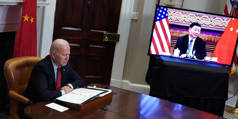
America Is Focusing on the Wrong Enemy
US President Joe Biden is treating a “rogue” Russia as a peer competitor, when he should be focused on the challenge from America’s actual peer, China. Not only is China more powerful than Russia; it also genuinely seeks to supplant the US as the preeminent global power.
NEW DELHI – Much of the democratic world would like the United States to remain the preeminent global power. But with the US apparently committed to strategic overreach, that outcome risks becoming unlikely.
The problem with America’s global leadership begins at home. Hyper-partisan politics and profound polarization are eroding American democracy and impeding the pursuit of long-term objectives. In foreign policy, the partisan divide can be seen in perceptions of potential challengers to the US: according to a March 2021 poll, Republicans are most concerned about China, while Democrats worry about Russia above all.
This may explain why US President Joe Biden is treating a “rogue” Russia as a peer competitor, when he should be focused on the challenge from America’s actual peer, China. In comparison to Russia, China’s population is about ten times bigger, its economy is almost ten times larger, and its military expenditure is around four times greater. Not only is China more powerful; it genuinely seeks to supplant the US as the preeminent global power. By contrast, with its military buildup on Ukraine’s borders, Russia is seeking to mitigate a perceived security threat in its neighborhood.
Hastening the decline of US global leadership is hardly the preserve of Democrats. A bipartisan parade of US leaders has failed to recognize that the post-Cold War unipolar world order, characterized by unchallenged US economic and military predominance, is long gone. The US squandered its “unipolar moment,” especially by waging an expensive and amorphous “Global War on Terrorism,” including several military interventions, and through its treatment of Russia.
After its Cold War victory, the US essentially took an extended victory lap, pursuing strategic maneuvers that flaunted its dominance. Notably, it sought to expand NATO to Russia’s backyard, but made little effort to bring Russia into the Western fold, as it had done with Germany and Japan after World War II. The souring of relations with the Kremlin contributed to Russia’s eventual remilitarization.
So, while the US remains the world’s foremost military power, it has been stretched thin by the decisions and commitments it has made, in Europe and elsewhere, since 1991. This goes a long way toward explaining why the US has ruled out deploying its own troops to defend Ukraine today. What the US is offering Ukraine – weapons and ammunition – cannot protect the country from Russia, which has an overwhelming military advantage.
But US leaders made another fatal mistake since the Cold War: by aiding China’s rise, they helped to create the greatest rival their country has ever faced. Unfortunately, they have yet to learn from this. Instead, the US continues to dedicate insufficient attention and resources to an excessively wide array of global issues, from Russian revanchism and Chinese aggression to lesser threats in the Middle East and Africa and on the Korean Peninsula. And it continues inadvertently to bolster China’s global influence, not least through its overuse of sanctions.
For example, by barring friends and allies from importing Iranian oil, two successive US administrations enabled China not only to secure oil at a hefty discount, but also to become a top investor in – and security partner of – the Islamic Republic. US sanctions have similarly pushed resource-rich Myanmar into China’s arms. As Cambodian Prime Minister Hun Sen, whose country has faced a US arms embargo over its ties to China, asked last year, “If I don’t rely on China, who will I rely on?”
Russia has been asking itself the same question. Though Russia and China kept each other at arm’s length for decades, US-led sanctions introduced after Russia’s 2014 annexation of Crimea drove President Vladimir Putin to pursue a closer strategic partnership with China. The bilateral relationship is likely to deepen, regardless of what happens in Ukraine. But the raft of harsh new sanctions the US has promised to implement in the event of a Russian invasion will accelerate this shift significantly, with China as the big winner.
The heavy financial penalties the US has planned – including the “nuclear option” of disconnecting Russian banks from the international SWIFT payments system – would turn China into Russia’s banker, enabling it to reap vast profits and expand the international use of its currency, the renminbi. If Biden fulfilled his pledge to block the Nord Stream 2 gas pipeline, which is set to deliver Russian supplies directly to Germany via the Baltic Sea, China would gain greater access to Russian energy.
In fact, by securing a commitment from Putin this month to a nearly tenfold increase in Russian natural gas exports, China is building a safety net that could – in the event of a Chinese invasion of Taiwan – withstand Western energy sanctions and even a blockade. China could also benefit militarily by demanding greater access to Russian military technology in exchange for its support.
For the US, a strengthened Russia-China axis is the worst possible outcome of the Ukraine crisis. The best outcome would be a compromise with Russia to ensure that it does not invade and possibly annex Ukraine. By enabling the US to avoid further entanglement in Europe, this would permit a more realistic balancing of key objectives – especially checking Chinese aggression in the Indo-Pacific – with available resources and capabilities.
The future of the US-led international order will be decided in Asia, and China is currently doing everything in its power to ensure that order’s demise. Already, China is powerful enough that it can host the Winter Olympics even as it carries out a genocide against Muslims in the Xinjiang region, with limited pushback. If the Biden administration does not recognize the true scale of the threat China poses, and adopt an appropriately targeted strategy soon, whatever window of opportunity for preserving US preeminence remains may well close.
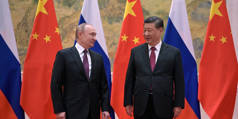
China's Triangulation Gambit
America's rapprochement with China, 50 years ago this month, isolated the former Soviet Union at a time when its economic foundation was starting to crumble. Today, there can be little doubt that China has revived triangulation as a strategic gambit – or that this time America is the one being triangulated.
NEW HAVEN – History’s turning points are rarely evident with great clarity. But the February 4 joint statement of Russian President Vladimir Putin and Chinese President Xi Jinping as the Winter Olympics opened in Beijing may be an exception – signaling a new turning point in a new Cold War.
Triangulation was America’s decisive strategic gambit in the first Cold War. Richard Nixon’s rapprochement with China, 50 years ago this month, isolated the former Soviet Union at a time when its economic foundation was starting to crumble. As Henry Kissinger put it in his opus, On China, “The Sino-US rapprochement started as a tactical aspect of the Cold War; it evolved to where it became central to the evolution of the new global order.” It took time for the strategy to succeed. But, 17 years later, the Berlin Wall came down and the Soviet Union imploded.
Never one to ignore the lessons of history, China is opting for its own triangulation gambit in a nascent Cold War II. A China-Russia tandem could shift the global balance of power at a time when America is especially vulnerable. This points to a worrisome endgame.
Important hints can be found in the triangulation of the first Cold War. Fearful of the Soviet military threat, the United States countered by embracing China in an economic marriage of convenience. Never mind that the US-China partnership, which initially provided cheap products for hard-pressed American consumers, has now been shattered by a trade and tech war. The point is that a comparable strategy has now brought China and Russia together.
This new marriage is convenient in both economic and geostrategic terms. Russia has the natural gas that an energy-hungry, coal-dependent, polluted China needs. And China, with its surplus savings, ample foreign capital, and its Belt and Road Initiative, offers Russia added clout to buttress its thinly-veiled territorial ambitions.
The geostrategic angle is equally compelling. Rightly or wrongly, both Xi and Putin are convinced that the US seeks to contain their supposedly peaceful rise. China points not just to former US President Donald Trump’s tariffs and to sanctions on its leading technology companies, but also to an ambitious Trans-Pacific Partnership that excluded China (and which has since morphed into the Comprehensive and Progressive Agreement for Trans-Pacific Partnership). More recently, Australia, the United Kingdom, and the US established the so-called AUKUS trilateral security agreement, which takes dead aim on China.
Putin makes a similar case in resisting US containment of Russia. Fearful of NATO enlargement, he appears more than willing to hold Ukraine hostage and take Europe to the brink of yet another devastating conflict. Putin, who has described the demise of the Soviet Union as “a major geopolitical disaster of the [twentieth] century,” would like nothing better than to rewind history. Yet US President Joe Biden’s threats may well have cornered Putin, leaving him with no face-saving path for de-escalation. For authoritarians, face is everything.
The joint Sino-Russian statement of February 4 leaves little doubt that both leaders are united in the view that America poses an existential threat to their ambitions. Putin was successful in getting Xi to weigh in against NATO expansion – an issue well outside the Chinese leader’s wheelhouse. And Xi co-opted Putin to sign on to an agreement that fits the template of “Xi Jinping Thought,” promoting their joint statement as yet another of China’s grandiose “new era” policy pronouncements.
There can be little doubt that China and Russia have embraced triangulation as a strategic gambit. Ironically, unlike the first Cold War, the US is the one now being triangulated. And, as before, there is good reason to believe that the endgame will be determined in the economic arena.
That’s where the comparison between the two cold wars is especially worrisome. From 1947 to 1991, the US economy was balanced and strong. By contrast, over the past decade, real GDP growth (1.7%) and productivity gains (1.1%) were half their average rate over that earlier 44-year period. Recent comparisons are even worse for domestic saving, the current account, and America’s gaping trade deficit.
The US prevailed in the first Cold War not just because its economy was strong but also because its adversary’s was hollow. Starting in 1977, per capita output growth in the Soviet Union slowed dramatically, before plunging at a 4.3% average annual rate in the final two years of the Cold War. That presaged a subsequent economic collapse in the Soviet Union’s successor. From 1991 to 1999, the Russian Federation’s economy shrank by 36%.
Today, a weaker US economy is facing a rising China, in contrast to the earlier clash between a strong America and a faltering Soviet Union. Nor is China’s clout likely to be diminished by Russia, a bit player in the global economy. In 2021, Chinese GDP was six times that of Russia, and the gap is expected to widen further in the coming years.
Yet Putin gives Xi precisely what he wants: a partner who can destabilize the Western alliance and deflect America’s strategic focus away from its China containment strategy. From Xi’s perspective, that leaves the door wide open for China’s ascendancy to great-power status, realizing the promise of national rejuvenation set forth in Xi’s cherished “China Dream.”
In late 2019, Kissinger warned that the US and China were already in the “foothills of a new cold war.” The plot has since thickened with the emergence of a new triangulation strategy. The Xi-Putin gambit reinforces the conclusion that this cold war will be very different from the last one. Sadly, America appears to be asleep at the switch.
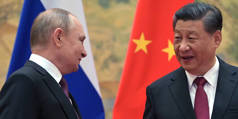
Has Putin Reversed Nixon?
Russia and China have historically had an uneasy relationship, exemplified by the Sino-Soviet split of 1960, which Richard Nixon sought to cement on his trip to China 12 years later. But Russia and China do not need to be perfect allies for their relationship to disrupt the international order.
MADRID – On February 21, 1972, US President Richard Nixon arrived in China for what would become a transformative week-long visit. Beyond establishing diplomatic relations with the People’s Republic, Nixon’s trip deepened the estrangement between China and the Soviet Union, thereby laying the foundations for a new world order. But, 50 years later, China and Russia are pursuing their own entente, with far-reaching implications.
Even if Russian President Vladimir Putin withdraws some of the troops massed near Ukraine’s border, as he has announced, and a diplomatic solution to the standoff with the West averts a Russian invasion, tensions between Russia and the West will not disappear any time soon. Nor will the Kremlin’s efforts to deepen Russia’s ties with China.
The rapprochement between China and Russia, which began with the 2001 Treaty of Friendship, has been slow but steady. It received a boost after Russia’s 2014 invasion and annexation of Crimea, with Putin (somewhat reluctantly) pivoting to the East, including by signing a 30-year, $400 billion deal to deliver gas to China.
Nonetheless, Russia and China have remained broadly reluctant to be drawn into each other’s fights. Despite the gas deal, China was hesitant to endorse the invasion of Crimea, nor has it backed Russia’s foreign adventures elsewhere, such as in Georgia. So, it was notable when, last month, China expressed support for Russia’s aggressive moves toward Ukraine, arguing that Russia’s “legitimate security concerns” must be “taken seriously.”
A little more a week later, Russia and China went much further, issuing a joint declaration on “international relations entering a new era.” While the Chinese Foreign Ministry published only a 1,200-word summary of the meeting, Russia published a 5,000-word text that displays a level of detail and scope not previously seen in the bilateral relationship.
The Russian text covers a wide range of topics, from the pursuit of “true multilateralism” to the expansion of bilateral cooperation in such areas as the “sustainable development of the Arctic,” the manufacture of COVID-19 vaccines, and security. While the pact stops short of mutual defense, it announces that Russia and China will work together to oppose “attempts by external forces to undermine security and stability in their common adjacent regions.”
Both sides reaffirm their “strong mutual support for the protection of their core interests, state sovereignty, and territorial integrity,” with Russia reaffirming its support for the One China policy and China declaring its opposition to NATO enlargement. “A trend has emerged,” the text proclaims, “toward redistribution of power in the world.”
It may be tempting to brush off these lofty pronouncements. And, in fact, pundits often have dismissed the notion that there is a “growing kinship” between America’s “top rivals.” They highlight how complex the relationship is, and they caution that perceptions inevitably shape reality.
It is true that Russia and China have historically had uneasy ties, exemplified by the Sino-Soviet split in 1960, which Nixon sought to cement 12 years later. Today, major sources of tension remain, including in Central Asia, Africa, and the Arctic. Russia’s intervention in Kazakhstan last month is unlikely to have pleased China. Meanwhile, Putin is keenly aware of the economic asymmetries and China’s rising geopolitical influence in what he considers Russia’s backyard.
So, the Russia-China nexus is most likely a marriage of convenience. It would hardly be the first time two countries that are complementary only through the lens of realpolitik – in this case an economic giant that might soon overtake the US in conventional military capabilities and a hydrocarbon-rich nuclear-armed state spanning 11 time zones – have agreed to cooperate.
But Russia and China need not be perfect allies for their relationship to disrupt the international order – and they know it. Their decision to express a joint, alternative vision signals a dramatic change in tone and tack.
While Russia has never shied away from challenging the international order, China has avoided showing open hostility toward it. Instead, it has publicly touted multilateralism and even democratic tradition, but a version based on “unique cultural characteristics.” It has used the language of the international order to usurp that order, by imbuing it with meanings that reflect China’s own ambitions.
Russia lately seems to be employing the same tactic in its standoff. And with the February 4 declaration, China seems to be endorsing Russia’s more assertive approach, perhaps in preparation for a foray into Taiwan. More broadly, the alternative vision for the global order that Russia and China are advancing could influence other countries, including in Europe’s neighborhood.
The West, together with its democratic partners and allies in Asia, should be thinking carefully about how to counter this “alliance of autocracies.” And yet, locked in competition with China, the US is not in a position to pull a Nixon-style diplomatic coup. Meanwhile, Europe remains riven by internal divisions and torn between aspirations for strategic unity and the false hope that it can achieve this by muddling through.
Economic engagement will not be enough to hold back the tide. The world’s democracies, led by the US and Europe, must work together to restore the prestige of the rules-based international order and to imbue the principles and practices of multilateralism with their true meaning. Unless and until that happens, the alternate vision put forth by the world’s autocracies will continue to gain ground.
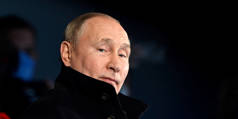
Putin Is No Nixon
By deepening ties with China, Russian President Vladimir Putin seems to think that he has secured an invaluable ally in his struggle against the West. In fact, it is China that wanted to get Russia on its side – and not as an equal partner.
MOSCOW – Russian President Vladimir Putin appears to think that, by signing an apparent alliance agreement with Chinese President Xi Jinping on February 4 in Beijing, he has pulled off the equivalent of US President Richard Nixon’s historic visit to China in 1972. But just as the Soviet Union was the big loser of the Sino-American rapprochement of 1972, Russia is likely to turn out to be the big loser from the new Putin-Xi agreement.
Nixon’s visit with Mao Zedong was a pivotal moment in the history of the Cold War, with a greater impact on its course than even the Cuban Missile Crisis. At the time, relations between China and the Soviet Union had become far more embittered than most of the world, including most Americans, ever realized.
Relations between the two communist giants began to decay significantly after Nikita Khrushchev’s 1956 “secret speech,” delivered to a closed session of the 20th Congress of the Communist Party of the Soviet Union, in which he denounced Stalin. That speech, together with Khrushchev’s broader de-Stalinization campaign, riled Mao, who decried it as revisionism – likely fearing that one day he might face similar condemnation.
Ideological and policy differences led to a breakdown of political relations, culminating in the Sino-Soviet split of 1960. Nine years later, Soviet and Chinese forces engaged in seven months of savage fighting along the Ussuri River, near Manchuria. All-out war was barely averted.
When Nixon headed to China, he sought to exploit this antagonism between the world’s two leading communist powers. But neither he nor his national security adviser, Henry Kissinger, could have predicted just how successful he would be. To Leonid Brezhnev’s stagnant and stodgy Kremlin, China seemed to have switched sides in the Cold War.
Faced with the Bismarckian nightmare of a two-front war against NATO in the West and an embittered China in the East, Brezhnev quickly warmed to Kissinger’s notion of détente between the United States and the USSR. He even went so far as to sign the Helsinki Accords, which enabled the West to challenge Soviet totalitarianism on human-rights grounds.
Kissinger, it is worth noting, deserves less credit for these achievements than he would repeatedly claim; Nixon was calling for an opening to China since before he became president in 1969. In any case, Putin may well believe that he has replicated America’s diplomatic coup. By deepening ties with China, Putin seems to think that he has secured an invaluable ally in his struggle against the West.
But China’s alienation from the US had been intensifying for almost a decade – a trend that former US President Donald Trump accelerated, and that President Joe Biden has done little to mitigate. Amid growing antagonism with the West, it is China that wanted to get Russia on its side, not vice versa – and not as an equal partner.
To be sure, despite its oft-repeated mantra that national sovereignty and territorial integrity are sacrosanct, China has now effectively backed Putin’s military build-up along Ukraine’s borders, urging the West to take Russia’s “security concerns” seriously and affirming its opposition to NATO enlargement. But this probably does not mean that China will back Russia in any struggle with the US and NATO.
Instead, Xi did what was needed to lock Russia into a vassal-like dependency on China. And Putin chose to walk straight into his trap, thinking that partnership with Xi would help him in his confrontation with the West.
What could be better for China than a Russian economy completely cut off from the West? All the natural gas that does not flow westward to Europe could flow eastward to an energy-hungry China. All Siberia’s mineral wealth, which Russia has required Western capital and expertise to exploit, would be available only to China, as would major new infrastructure projects in Russia.
Anyone who doubts the abandon with which Xi will exploit Russia’s isolation need only look to the actions of Xi’s predecessors, Hu Jintao and Jiang Zemin. At first, relations appeared warm. Putin signed a Treaty of Friendship with China in 2001. And with Russia financially isolated, China provided a $6 billion loan in late 2004, so that Russia’s state-owned oil company Rosneft could finance the purchase of the largest production unit of Yukos Oil Company (a firm that Putin’s government would succeed in bankrupting in 2006).
In 2005, however, in a move many believe was directly tied to the Yukos loan, China used its leverage over Russia to compel the Kremlin to return some 337 square kilometers (130 square miles) of disputed lands, in exchange for China’s withdrawal of other territorial claims. But Putin seems to be ignoring that China’s leaders and people view Russia as a corrupt country which stole more Chinese territory in the nineteenth century than any other. Just two years ago, I witnessed their disdain firsthand when taking a ferry across the Amur river from Blagoveshchensk in Russia to Heihe, a small Chinese town. The local Chinese merchants openly mocked the Russians as they sold them cheap phones and knockoff furs.
China will neither risk its own prosperity by openly challenging the US in defense of Russia, nor prop up Russia’s economy by investing on the scale needed to offset the impact of the mighty sanctions the West will impose if Putin launches an invasion of Ukraine. Instead, China will do the bare minimum to enable Russia to sustain its confrontation with the West, and thus divert the West’s attention from the strategic challenge posed by China itself. That bare minimum of Chinese assistance may be just enough to keep Putin in the Kremlin, which is all he cares about. But the Kremlin’s master will be ruling over a Russian economy that is slowly being bled white.
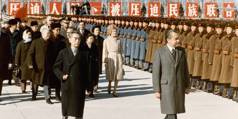
America and China's Unhappy Anniversary
Fifty years ago, the United States responded to the Sino-Soviet split with a foreign policy that was creative in both design and execution. Given the current poor state of Sino-American relations, the best way to mark the anniversary is by crafting an equally imaginative approach to reviving bilateral cooperation.
NEW YORK – The United States and China are this month marking the golden anniversary of their modern relationship. In February 1972, US President Richard Nixon and his national security adviser, Henry Kissinger, stepped off a plane in Beijing, and shortly afterward met with Communist Party of China Chairman Mao Zedong. Their visit triggered a geopolitical earthquake, what Nixon referred to as “the week that changed the world.”
This historic rapprochement swept away two decades of enmity between the People’s Republic of China – known by most Americans then as Red or Communist China – and the US. The antagonism had its roots in the Chinese civil war, in which the US supported the anti-communist nationalist side, which lost and was forced to flee to Formosa (Taiwan) in 1949. The following year, Chinese and American soldiers started fighting and killing one another in the Korean War.
Rising Sino-Soviet tensions in the late 1960s produced a diplomatic opening. Nixon and Kissinger, along with Mao and Zhou Enlai, China’s premier and leading diplomat, regarded the Soviet Union as a shared adversary. China sought protection against a one-time benefactor with which it had fought a deadly border clash in 1969. Nixon and Kissinger, meanwhile, believed an entente with China would give the US leverage against the Soviets and might hasten the end of the Vietnam War. It was a classic case of my enemy’s enemy being my friend.
Even with this convergence of interests, achieving a breakthrough was not easy. The two governments had to agree to manage, rather than resolve, many of their differences. The carefully negotiated document released at the end of Nixon’s trip, the Shanghai Communiqué, noted the differences between the two countries’ political systems and foreign policies.
Regarding Taiwan, the most contentious issue, China stated its position that the Communist government on the mainland was China’s sole legal government and that Taiwan was a province of China. In an example of creative diplomacy at its best, the US acknowledged, but did not endorse, the Chinese position and highlighted its interest in a peaceful settlement of the dispute.
Shared animosity toward the Soviet Union was the glue holding together the Sino-American relationship for the next two decades, until the Cold War ended and the Soviet Union collapsed. China and the US then thought they had found a new rationale for their relationship in burgeoning economic ties. Each side wanted access to the other’s market; the Chinese also wanted access to American capital and know-how. Bilateral trade increased dramatically, from roughly $20 billion in 1990 to $120 billion a decade later.
Bilateral trade accelerated further with China’s entry into the World Trade Organization in 2001, which the US backed in the hope it would encourage the emergence of a more market-oriented, liberal China. For a while, this seemed like a reasonable, if long-term, bet. But, over the past decade, under President Xi Jinping, the government’s role in the Chinese economy grew, subsidies increased, and intellectual-property theft continued. The economic relationship grew increasingly one-sided, with the annual US bilateral trade deficit with China consistently running in the hundreds of billions of dollars.
Likewise, hopes that economic engagement would bring about political liberalization proved futile. Under Xi, China has become more repressive than at any time since the Mao era. The central government has crushed democracy in Hong Kong, instituted tight controls over the internet, and forced about one million Uyghurs into re-education camps in an effort to erase their religious and cultural identity.
In addition, China has become much more assertive abroad. It has militarized the South China Sea, used force against India, and repeatedly dispatched its military to threaten Taiwan and Japan. As a result, a new cold war between the US and China is widely assumed to be either inevitable or already underway. Some observers even argue that the entire effort to integrate China into a US-led world order was an ill-advised fantasy, a doomed gambit that accelerated the emergence of a great-power rival.
Adding insult to injury is the reality that what began 50 years ago as Sino-American cooperation against the Soviet Union has morphed into Sino-Russian cooperation against the US. In a recent joint statement, Russia lent support to China’s position regarding the origin of COVID-19, as well as on Taiwan. China returned the favor by opposing further NATO enlargement and, in an additional sop to Russian policy toward Ukraine, failed to reiterate its long-held foreign-policy tenet of non-interference in other countries’ internal affairs.
The deteriorating trend in Sino-American relations is dangerous for the world. The growing geopolitical rivalry between the US and China not only could lead to conflict but also risks precluding cooperation on global challenges ranging from climate change and infectious disease to cyber threats and nuclear proliferation.
A half-century ago, the US responded to the Sino-Soviet split with a foreign policy that was creative in design and execution. Nixon’s diplomatic coup helped to ensure that the Cold War remained cold and ended on terms favorable to the West.
The best way to mark the 50th anniversary of the opening to China is not with champagne but by crafting an equally imaginative approach to help revive the relationship. This would again acknowledge the differences between the two countries’ political and social systems, continue to finesse their disagreement on Taiwan, maintain economic ties other than those involving sensitive technologies, and foster cooperation on regional issues such as Afghanistan and North Korea, in addition to tackling global challenges together.
It is no less essential that the US address its domestic divisions, expand its cooperation with European and Asian allies in order to deter Chinese aggression, and join regional trade pacts. Regular, high-level discussions with Chinese leaders are imperative. The goal should not be to transform China, something beyond our ability, but to influence its behavior. Diplomacy is an instrument of national security that must be used if other instruments, including the military, are not to be overused.
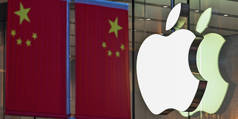
Understanding China Since Nixon
US policymakers may be tempted, for geopolitical reasons, to reverse the policy of economic engagement with China pursued by successive administrations in the decades following President Richard Nixon’s historic 1972 visit. But such a step would carry significant risks.
NEW YORK – On February 21, 1972, Richard Nixon became the first US president to visit the People’s Republic of China, setting in motion a process that would end China’s decades-long isolation and kick-start the emergence of a modern, dynamic economy. But, despite the seismic economic changes in China in the intervening half-century, many in the West regard today’s People’s Republic as an unreformed communist country whose unfair trade practices are harming Western workers and consumers. Although this impression is partly a by-product of today’s geopolitical competition, it also reflects a lack of historical perspective.
At the time of Nixon’s visit, China was as isolated and closed off from the world as North Korea is today. Ordinary Chinese had no freedom to choose where to work and had to accept jobs assigned by their local government. Almost every Chinese adult worked for the state or in a state-owned firm, because no privately owned domestic enterprises or foreign firms operated in the country. Nixon’s entourage also noticed an astonishing lack of color on the streets, as most Chinese wore either blue or green. There was not a single foreign brand on the streets of Beijing or Shanghai.
Today, Chinese can choose their place of employment, more than 80% of the workforce are employed by firms not owned by the state, and wages are determined by supply and demand in the labor market. An international tourist cannot tell from people’s clothing alone whether she is in Shanghai, Seoul, Tokyo, or Taipei. Virtually all major global brands that can be seen in New York, London, and Singapore, are ubiquitous in major Chinese cities as well.
Apple, Boeing, Caterpillar, Starbucks, and many other foreign companies are currently doing brisk business in China, supporting the returns of US pension and mutual funds that invest in them. General Motors sells more cars in China than in America or any other market. And firms in China that are wholly or majority owned by foreign investors account for 40% of China’s exports.
At the time of Nixon’s visit, the Chinese government’s most important border control policy – as in East Germany then or North Korea now – was to prevent ordinary Chinese from escaping the country for good. In 2019, the last year before the COVID-19 pandemic began, 150 million Chinese tourists visited the United States, Europe, Southeast Asia, and other regions, and returned home voluntarily. The personal freedom ordinary Chinese have now was unimaginable in 1972.
China’s transformation has not resulted in Milton Friedman’s brand of capitalism, in which the state plays a minimal role in the economy. But China has adopted many regulatory institutions similar to those in Germany, Japan, and even the US. China’s Food and Drug Administration, established in 1998, is partly modeled on its US counterpart. And the design of its State Environmental Protection Administration (now called the Ministry of Ecology and Environment) was influenced by that of the US Environmental Protection Agency.
Even China’s much-criticized industrial policy took its intellectual inspiration from Alexander Hamilton, who pioneered the concept. The China 2025 program, which aims to promote what the Chinese government regards as the industries of the future, resembles not so much Soviet central planning as Germany’s Industrie 4.0 initiative or even America’s own numerous industrial policies.
So, was Nixon right to help China reconnect with the world? To the extent that his visit and subsequent US policies contributed to China’s success in lifting a billion people out of abject poverty, it is difficult to think of another initiative that could have done more to promote human welfare.
Of course, that was not the motivation for Nixon’s diplomatic coup, which strengthened America’s hand in its struggle with the Soviet Union. But it is equally important – yet somehow often overlooked – that US households and firms have benefited tremendously from China’s economic rise.
US exports to China have increased faster than US exports to Europe, Japan, Mexico, Canada, Brazil, or Australia over the last three decades. While imports from China seem to have contributed to a decline in US manufacturing jobs, employment and value added in America’s modern service sectors grew faster, because low-cost Chinese products such as laptops and electric equipment boosted efficiency. Cheaper Chinese goods undoubtedly helped to hold down goods prices in Western economies from the 1980s until recently. And throughout the period of America’s increased economic engagement with China, there was no secular increase in US unemployment.
Former US President Donald Trump’s misguided trade war with China implies a reversal of these trends. By raising tariffs on Chinese imports to the level that prevailed under the Smoot-Hawley Tariff Act before World War II, Trump ensured that American households and firms faced higher prices than they otherwise would have. America’s trade deficit has widened rather than narrowed, partly because US firms are losing competitiveness in the global market as a result of the trade war.
While US policymakers are tempted, for geopolitical reasons, to end the policy of economic engagement toward China pursued by successive administrations in the decades following Nixon’s 1972 visit, the risks are significant. US living standards would likely increase less fast. While Chinese economic growth would suffer, the support for American institutions and ideals among many ordinary Chinese could decline as well. If a US decoupling strategy were to accelerate China’s strategic rapprochement with Russia, perhaps even resulting in a formal alliance, a combination of Russia’s nuclear arsenal and China’s mighty economy could present a more nightmarish challenge to US global hegemony.
Fifty years after Nixon’s historic visit, Sino-American relations are at a historic nadir. While finding common ground with China seems challenging in the current geopolitical context, the logic that engaging China in the world can enhance the personal freedom of the Chinese and also provide benefits to American households and firms remains as true as ever.
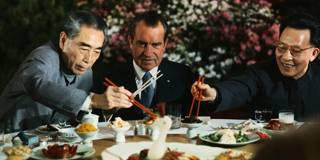
LONDON – In Seize the Hour, her excellent book about the first meeting between US President Richard Nixon and Communist Party of China Chairman Mao Zedong in Beijing, the historian Margaret MacMillan enumerated some of the profound implications of this extraordinary encounter. The meeting, which took place 50 years ago this month, ended a long political standoff between the United States and communist China, and marked the beginning of a new geopolitical era. And it indicated, perhaps, that there could be no permanent peace in the world unless China and America were able to work together.
But what should be the basis for the Sino-American relationship? For Nixon and his national security adviser, Henry Kissinger, the meeting was to undermine the Soviet Union’s global influence by driving a wedge between the world’s two most important communist countries. Nixon’s visit also enhanced his reputation as a global statesman, whatever his domestic reputation in the US. As Chinese Premier Zhou Enlai observed, “a farsighted man” who knew how to steer the helm of the ship of state through stormy waters had fundamentally changed the way that China and America dealt with each other.
There were also short-term consequences, of course. Nixon’s visit may have encouraged North Vietnam to be more responsive to America’s efforts to end the Vietnam War. The Soviet Union certainly was very concerned about the historic US-China rapprochement, and some of America’s Asian allies – Japan and Taiwan, for example – worried that the US might push them to one side.
But, in retrospect, arguably the most important legacy of the Nixon-Mao meeting is that it made possible some of the other major developments that followed. Nixon’s fall in 1974 came two years before the deaths of both Mao and Zhou. Following Mao’s death, his chosen successor, Hua Guofeng, aided by the armed forces, swiftly ousted the so-called Gang of Four, Mao’s main radical allies during the Cultural Revolution. This cleared the way for the eventual return to power of Deng Xiaoping, which triggered the beginning of China’s economic opening to the world. This would never have happened had China remained cut off from America and the rest of the world.
China’s economic rise in the subsequent decades, driven largely by exports to open world markets, has been phenomenal, transforming the country and its prospects. The economic and trade environment that enabled the Chinese miracle was created largely by the international policies of the rich world’s democracies. In one 15-year period covering the 1990s, for example, China’s exports to the US increased by 1,600%.
But while the world’s markets have been largely open to Chinese goods and investment, China has done relatively little to reciprocate. It has stolen intellectual property from America and Europe, and demanded that other countries kowtow politically in exchange for frequently illusory trade benefits. China persuaded other countries to admit it to the World Trade Organization in 2001, but has since regularly bent and circumvented WTO rules.
Under President Xi Jinping, China has emerged as a more brazen bully. Xi’s China has broken its promises on economic, security, and political issues, handcuffed Hong Kong, militarized islands and atolls in the South China Sea, threatened Taiwan, and been accused of pursuing genocidal policies against Muslim Uyghurs in Xinjiang. It is regarded across the US political spectrum as an increasingly dangerous surveillance state that poses a threat to open societies everywhere, and to efforts to create a balanced global order.
The challenge for the US and other democracies is to manage the relationship with a menacing communist China while involving it – as we must – in efforts to address issues affecting the future of the planet, above all climate change. Xi’s regime does not accept that it should act in accordance with international agreements, and it rejects the views of open societies on what constitutes acceptable governance. But while we need to constrain China, and deter it from behaving badly, we must avoid isolating it.
If Nixon was on the world stage today, I hope he would remind us that China’s communist regime fears the strength of democratic societies as an existential threat. After all, open societies have a free press, accountable government answerable to informed citizens, and an education system that encourages critical thinking rather than indoctrination. When democracies understand and live by their principal governing values, they have nothing to fear in standing up to China.
Fifty years after Nixon’s historic visit to China, those values remain a better long-term bet than totalitarianism. Democracies should not be dazzled by China’s undoubted technological advances; it is the most populous country in the world and has many able citizens. The surprise, rather, is that it hasn’t done even better. In any case, we must hope that Chinese successes will benefit all of humanity, just as open societies’ advances have benefited China.
But what China in the modern era has never succeeded in doing is finding an acceptable long-term governance model. Standing up for the values of open societies may be the best way to help the country – and ourselves.